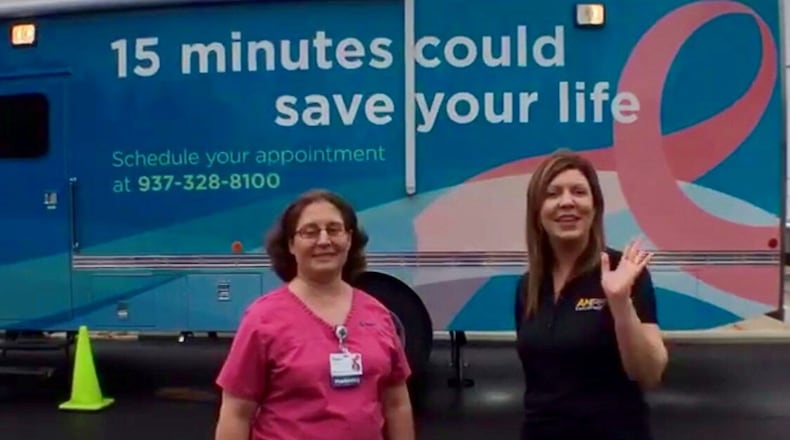At 36, Leibold feels peace of mind after having her first mammogram. “It made me feel good,” she said. “The ladies were very warm and welcoming and easy to talk to.”
>> What you need to know about today’s Making Strides cancer walk
In January 2017, Mercy Health borrowed a mobile mammography unit from a sister hospital in Columbus. “It proved successful because the need was so great and the barriers were so great to getting a mammogram,” said Dawn Naill, the Mercy Health marketing specialist in charge of the program, which now boasts its own brightly-colored truck.
Breast cancer screening rates nationally declined between 2000 and 2015 after soaring during the ‘80s and ‘90s. The mobile mammography units are an example of the many ways that area health care providers are fighting back, reaching out to underserved and uninsured women by offering free screenings through programs such as the Breast and Cervical Cancer Project and the Kettering Health Network’s Women’s Wellness Fund. Yet the federal government’s Healthy People 2020 goal — for 81.1 percent of women ages 50 to 74 to be screened at least every other year — continues to be elusive due to factors such as lack of insurance, overscheduled lives and fear of the procedure itself.
>> Meet the woman who guides breast cancer patients through their journey
“We know historically that a lot of women don’t follow through with preventive screening because of a lack of insurance,” said Shari Martin, program director Breast and Cervical Cancer Project (BCCP) through Premier Community Health. It’s a grant program through the Ohio Department of Health that offers free breast and cervical cancer screenings and treatment for uninsured women in 16 southwestern Ohio counties.
>>Breast cancer patients may help boost survival chances by building muscle, study says
It has been a godsend for nearly 1,000 women in the past year who might otherwise not have been able to afford life-saving screenings and treatments. An additional 317 women received vouchers for screenings and tests through the Premier Community Health program.
Preventive measures are paying off, Martin said, with a 33-percent reduction in cancer mortality rates in Ohio from 1996 to 2014. But much work remains to be done; mortality rates are 35-percent higher for black women, primarily because they are getting screened and diagnosed at a later stage, Martin said.
Busy schedules can be a barrier to regular screenings, said Sally Grady, director of Kettering Breast Evaluation Centers (KBEC) for Kettering Health Network.
“As women we are so busy taking care of our families that we tend to put ourselves last,” Grady said. “You can be in and out of our sites within 20 minutes, with easy parking. We want to make the experience as good as we possibly can and to really hold their hand through the whole process.”
KBEC also is allaying women’s fears about an unpleasant, painful experience by introducing a new “SensorySuite” at its Lincoln Park site. Women can choose from one of three backgrounds – seaside, garden or waterfall – projecting scenic images on an oversized LED screen. “They can watch beautiful beaches and waterfalls set to music while wearing a warm gown,” Grady said. “We want to change the way a woman experiences a mammogram.”
>> New grant will help Clark and Champaign foundation boost breast cancer screenings
Annual mammograms for women over 40 are important, she said, because early detection greatly increases the chances of survival. “A lot can happen in a year,” Grady said.
It’s natural for women to feel so busy they forget to schedule a mammogram – and it’s also dangerous, Naill concurred: “Ladies just get busy and they forget about it. At our very first public event, a patient was diagnosed with breast cancer. She had fallen out of the loop, and it had been six years or so since her last mammogram.”
Leibold was pleased when several passersby walked in off the street at her workplace event. She encourages other employers to bring the mobile mammography coach to the workplace. “It’s a way of letting your employees know that they matter, that they support women’s health and want to do whatever they can to help their employees to stay healthy,” she said. “And all they need is a big enough parking lot to cover the bus.”
Since its inception, Mercy’s mobile mammography unit has screened 1,600 patients, resulting in 15 diagnoses. Half of those were walk-ins.
“Many have never had a mammogram, and they’re scared,” Naill said. “And afterward they say, ‘That was not that bad; I don’t know why I waited.’”
>>$850K mobile unit to combat high breast cancer rates in Clark County
COMMUNITY RESOURCES
- Mercy Health mobile mammography unit: If businesses want to schedule the van to visit their site, contact Dawn Naill, at 937-523-9330 or DNaill@mercy.com.
- Breast and Cervical Cancer Project: Call 1-866-838-8973.
About the Author


